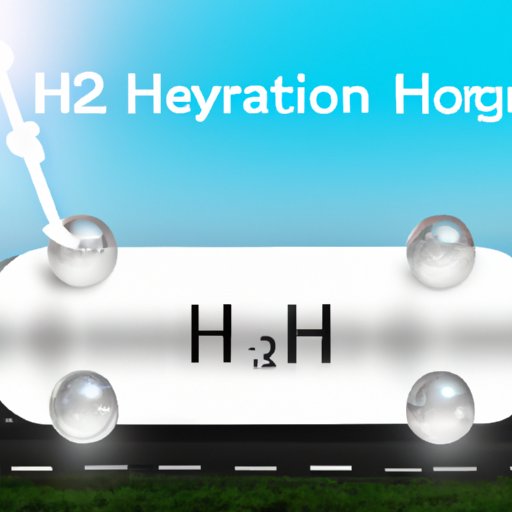Introduction
Hydrogen technology has been gaining traction in recent years as a potential alternative to fossil fuels. It involves the use of hydrogen as an energy source, most commonly through the process of electrolysis. The technology is versatile and has many applications in both transportation and energy production and storage. In this article, we explore what hydrogen technology is and how it is being used today, as well as what the future may hold for this promising technology.

The Basics of Hydrogen Technology
Hydrogen technology involves the use of hydrogen as an energy source. This is done through a process called electrolysis, which involves passing an electric current through water molecules to split them into their component parts – oxygen and hydrogen. The hydrogen can then be stored and used as a fuel to generate electricity or power engines.
The components of a hydrogen technology system include a hydrogen generator, a fuel cell, and a storage tank. The hydrogen generator produces the hydrogen gas by passing an electric current through water molecules. The fuel cell converts the hydrogen gas into electricity, and the storage tank stores the hydrogen gas until it is needed. These components work together to create a self-contained energy system that can be used to power various applications.
Hydrogen technology can be used in a variety of applications, including transportation, energy production and storage, and industrial processes. In transportation, hydrogen fuel cells can be used to power cars, buses, and other vehicles. In energy production and storage, hydrogen can be used to generate electricity and store excess energy. In industrial processes, hydrogen can be used to produce heat and power various types of machinery.
How Hydrogen Technology Is Being Used Today
Hydrogen technology is already being used in several different ways today. In transportation, hydrogen fuel cells are being used to power cars, buses, and other vehicles. Toyota, Honda, and Hyundai all offer hydrogen-powered vehicles, and there are now more than 10,000 hydrogen fuel cell vehicles on the road worldwide.
In energy production and storage, hydrogen is being used to generate electricity and store excess energy. Several countries, including Germany, Japan, and the United States, have launched pilot projects using hydrogen to store excess solar and wind energy. Additionally, some companies are using hydrogen technology to power their industrial processes, such as steel and chemical production.

A Look at the Future of Hydrogen Technology
The potential for hydrogen technology to reduce emissions is one of its most promising aspects. According to a study by the International Energy Agency, hydrogen could be responsible for up to 24 percent of global energy consumption by 2050, reducing emissions by 6 gigatons per year. Additionally, hydrogen technology is expected to expand into other areas, such as heating and industrial processes.
“The potential for hydrogen to decarbonize our economy is immense,” said Fatih Birol, executive director of the International Energy Agency. “We need to see greater commitment from governments to support the development and deployment of low-carbon hydrogen technologies.”

Examining the Pros and Cons of Hydrogen Technology
Like any technology, hydrogen technology also has its advantages and disadvantages. On the plus side, hydrogen is a clean energy source with no carbon emissions. Additionally, it is more efficient than traditional fossil fuels, providing more energy for less cost. Finally, hydrogen technology is versatile and can be used in a variety of applications.
On the downside, hydrogen technology is still relatively expensive compared to traditional fossil fuels. Additionally, the infrastructure required to store and transport hydrogen is still being developed. And while hydrogen is a clean energy source, producing it currently requires the use of fossil fuels.
Conclusion
Hydrogen technology has the potential to revolutionize the way we produce and use energy. It is a clean, efficient, and versatile energy source that can be used in transportation, energy production and storage, and industrial processes. As the technology continues to develop, it has the potential to reduce emissions and expand into new areas. While there are some drawbacks to hydrogen technology, its advantages far outweigh its disadvantages, making it an attractive option for the future.
In conclusion, hydrogen technology holds great promise for the future of energy production and consumption. With continued investment and research, it could be a key part of the transition to a cleaner, more sustainable energy system.
(Note: Is this article not meeting your expectations? Do you have knowledge or insights to share? Unlock new opportunities and expand your reach by joining our authors team. Click Registration to join us and share your expertise with our readers.)
